- Home
- Marge Piercy
Gone to Soldiers Page 7
Gone to Soldiers Read online
Page 7
Jeff had pulled him out of the car before it burst into flames. Jeff had been bicycling home from a rendezvous in the Garfinkles’ hayloft with the middle sister. Pulling the unconscious bleeding Zach from the smoking wreckage, he had then returned to the Garfinkles and borrowed or stolen a horse, on which he loaded Zach and took him to Bentham Center Hospital. Then he returned the horse and peddled home, excited and pleased with himself, to tell her the story.
That injury had pulled Zach out of the sophomore football team and toned down his drinking. It had also made the two boys friends, and Bernice had tagged along when they would have her. Zach loved sporty fast cars, sporty fast yachts, but while he was recuperating from breaking four bones, he passed the time by learning to fly. When Zach learned to fly, his friends learned to fly—at his expense, of course. Solitude was for him a temporary state, to be mended at once. Call out the troops. Bring in the companions. Summon the loyal retainers. He wanted companionship, always, in his escapades, and flying had become her passion, her center.
Why did she imagine that earning a commercial license would free her? She would still have her duty to take care of her father; winning air races, testing planes like Jacqueline Cochran was remote as joining a pirate ship.
As she peeled potatoes she glanced at the calendar. Three more days till Sunday, the seventh, her next injection of movie drug. Twenty days till Christmas. When would Jeff arrive? Tonight, after she had cleaned up, she would write, pressing him to fix a date for his homecoming. For Christmas she had already persuaded Professor Horgan, who taught art history, to pick up a tube of cadmium red and cadmium yellow in Boston for Jeff, expensive paints he loved and often could not afford. He would be delighted.
With small bribes, small promises, with endless fantasies, she made herself continue. What else was there; what else would there ever be, for Professor Coates’s daughter, who had inherited the care and feeding of her father, who kept house for him and whose house kept her?—Bernice who flew in her sleep and wept only upon waking, briefly, for she was too sensible to cry long over what could not be changed or shirked.
JEFF 1
Emplumado
It had been stupid to get into a fight with Quinlan and bloody his nose. Still it got Jeff out of Taos, and he felt a sweet relief in loosing some of the anger he had been hoarding over the past months.
How surprised Quinlan had been, always assuming that because Jeff was soft-spoken and artistic, he would swallow any insult. Jeff enjoyed a fight when he could no longer stay out of it. He liked pushing himself physically. It was the same as backpacking up into the mountains, which his acquaintances in Taos regarded as bound to end in falling off a cliff or getting lost. He had first climbed in Austria, and then in Switzerland. He had found the local mountains fascinating but not overly demanding. He had found Quinlan easy to knock down.
Quinlan had acted the bully from the beginning. He was managing the dude ranch for a combine that owned it, pocketing, Jeff suspected, as much as he could get away with and taking it out of the care of the animals, the accommodations and food of the hired help and little irritating economies such as there never being toilet paper in the latrine the help used.
What Quinlan had called him was not the reason for punching him, only the excuse. Quinlan, who lacked a gift for invective, called him a pinko fag. Jeff was a pinko because he supported Roosevelt’s economic policies, although he felt that the President was not pursuing them hard enough. He was a fag because he had avoided getting into bed with Mrs. Terwilligher, who was rich, as obnoxious as Quinlan and could not possibly like him any more than he could endure her. Jeff had made a practice of pretending he did not understand the help were to be sexually available to the vacationers, that sexual service was expected from the waitresses, chambermaids and trail hands, as they were called, who shepherded the overfed along careful scenic routes.
Jeff had nothing in principle against the setup. When he had accompanied his father The Professor’s charges on their cultural rounds, he had viewed them as a harem from which to choose bedmates. He did not think The Professor had ever caught on, although Bernice knew. She was surprisingly broad-minded for a virgin. Poor Bernice. His Bird in a very plain cage.
He shipped the two paintings he considered the best to Bernice along with his French easel, after paying off his local debts with canvases and leaving three at the gallery just in case. If they did sell, he was sure he’d never see the money, but at least they’d display them. As a landscape painter who worked relatively small, he was definitely unfashionable, but not unsellable. Still, he had not done his best work in Taos. He kept seeing work by other painters that seized the formal essence of the landscape, as O’Keeffe or Dasburg, or the tumultuous changes of sky and mountains, as Marin had done, always the Sacred Mountain. He had not made Taos his own. Its clarity had not crystallized him. He walked out of town and hitched a ride to Denver.
He carried his few things on his back in a rucksack, easier to tote than a suitcase, but no Americans seemed to use them. In Denver he found a flop near the station. He fished a newspaper out of a trash can. The Russians were supposed to be counterattacking in the suburbs of Moscow. Zach had written from London, where he had gone with the idea of enlisting in the RAF, but they had turned him down. Too many ancient injuries? They might have considered Zach over the hill at twenty-eight. It was not that Zach hated the Nazis. His own family’s run of political ideas was not dissimilar. Jeff could easily imagine Zach’s father, Zachary Barrington Taylor the third—as Zach was the fourth—saying, “That Hitler is a trifle crude but he knows how to keep the workers in line,” and contributing to the party coffers. Zach simply was going where things looked lively. He loved flying. He had grown up on dreams of fighter duels from the World War and he wanted to take on the Red Baron. In recent years Zach had been doing something boring in the family insurance business in Chicago; that is, the Taylors had a controlling interest in that combine as well as numerous others, not to mention the Barrington domain of textiles and sugar. Zach had done his family duties, marrying and fathering a child. Jeff had nothing to do with the respectable side of Zach’s life. He would hardly be received there.
Zach urged him to come over to England, but neglected to send tickets, which meant he was not serious. Zach must know Jeff had not the money to get himself home, let alone to Europe. What had the Depression meant to Zach: more riffraff in the streets? Jeff, whose life had been chopped up by the Depression into segments of manual labor and unemployment in diverse cities and landscapes, who was sleeping in a cubicle in a fleabag hotel for the hundredth time, who had worked for the CCC and worked for the WPA and broken stone building a highway and harvested wheat, experienced a moment of resentment so strong he felt it could pierce his friend like a dagger of ice.
But Zach did not get on with his own father any better than Jeff did with The Professor; Zach had early fallen into the second son, bad son, black sheep role. He had never fitted into the life laid out like a suit of formal clothes by a valet. Had he finally escaped?
Jeff wanted to go home. Not to his father, who was a cold compulsive preoccupied with his own work and his own comfort, and who made him feel like a bad child who played truant. For all the years The Professor had spent dragging charges through the museums of Europe, he had no understanding of a son who painted. Jeff wanted to go home to Bernice, who was and wasn’t his mother. Of course she wasn’t, because they had had a real mother, that creature of flesh and intellect and humor and fussiness, the best faculty cook, who loved poetry and read it to them instead of silly children’s books, who read them the Pope translation of the Iliad and sometimes recited for them the Greek, whose lap never failed in its size and warmth.
In another sense Bernice was his mother, because she was all he had had thereafter. They had raised each other. If only she had been his twin, a boy growing into man, they would roam the world together. Bernice would have made a handsome man. As it was, she was too tall for a woman, five nine, bi
g-boned, a woman who could pull a plow. In another era, she would have been more appreciated, he thought. Picasso’s big squarish nudes of his recent classical period made Jeff think of his sister.
Now he wanted to be with her, gathered into that intelligent warmth that was never entirely without judgment but never off-putting. He wanted coddling. He wanted to share with her the adventures that since he was a kid had been almost more satisfactory in the telling than in the living. Nothing was quite real until Bird received it. Instead here he was in Denver.
If he hitched down to Boulder, he could get a ride when school let out for Christmas, but the thought of waiting that long made him shrivel with self-pity. He wanted to look at that last canvas he had completed, shipped to Bernice. He wanted to paint from the cliffs of Jumpers Mountain in the morning with a dusting of snow on the scene.
He’d either hitchhike with truckers or ride the rails, but he never asked for money from home. The Professor was paid barely sufficient to maintain the household. War had put an end to his summer excursions, which had brought in as much as his nine months of teaching. Bernice made do, but Jeff knew how carefully she managed. He himself had vastly enjoyed that bourgeois summer life, hotels, restaurants, museums, playing the artist he really was. In Taos in the local uniform of Levi’s, bandanna and boots, social classes mixed, but still he was living as a ranch hand, not as a painter. That hurt.
Bernice had been allowed to attend classes, but was not granted a degree by St. Thomas. The Professor would not allow her to work, even if she had been qualified for anything. He, Jeff, would always land on his feet. He was no remittance man, adventuring on a sure monthly check. He was also free. When he went home, it was because he longed for his sister, not because he expected anything of them. Now getting there was the little problem to be solved.
Dolores had offered that haven at first, that warm place he sought with women. Women always seemed to pick him out in a crowd, at a party. One of the tedious aspects of being down and out was that the jobs he could fall into often kept him in an all-male enclave, and the truth was that most men had no idea how to live. They built no nests, they created no comfort, they made the worst out of their shortfalls. He liked to move in with a woman.
He had not actually lived with Dolores, for he had his lodging as part of the job on Quinlan’s dude ranch, and Dolores was mindful of the neighbors’ opinions. Still she had cooked for him frequently, and he had had the cosiness of her whitewashed adobe house to curl into. He had liked to look at her, even done a few sketches, although he knew that when he did one of his rare figure paintings, the people turned into landscapes. Her face was fascinatingly asymmetrical. Dolores herself was not aware of the way one side of her face was more angular and the other softer. Shadow playing over it had never stopped attracting him. Her body was neatly voluptuous, the flare out to the buttocks accentuated, her hips going out in a baroque curve that had two distinct waves to it. Her skin had hints of amber and of a faint green in its duskiness.
Dolores had told him he was an old tomcat, un gaton, who had got used to wandering and cadging meals. Then she had put pressure on him to settle down. Why did women do that? They picked him out for his air of being well traveled, the romantic allure of the wanderer who tomorrow would be gone, and then they attempted to enlist him in domesticity.
In ordinary times he would have been graduated from college and gone to a studio school here or abroad, come back to teach and paint, married and had children. But there had been no money and no jobs. He had begun wandering with the army of homeless men from freight train to skid row to hiring hall. By the time he had won the competition for a WPA job painting murals on post offices, he had got used to picking up and leaving a set of complications.
He would settle eventually but only when he found the right place, the proper place, his own landscape, a woman who combined Dolores’s beauty with Bernice’s independence and brains. He was like someone who had been put on morphine out of necessity, to kill pain, and grown addicted. Moving on had become a habit, but he dreamed constantly of a companion. Someone who would know what things had been like in the town before or the previous country, who remembered Barcelona before Franco and London before the blitz and Paris before the Nazis had occupied it. A common frame of reference. Not even fear of war was that. Most people seemed to assume it would never come. The only common culture seemed to be movies and comic strips. Everybody would talk about Gasoline Alley, Li’l Abner, Dick Tracy. Maybe that was why he needed to go home, now, immediately. Bernice was his repository. All stories ended in her mind.
Thursday morning he cleaned himself up at the train station and headed for a truck depot. He was almost immediately successful. An independent driver who was picking up a load of tires and taking them north to Cheyenne would carry him along for the work at either end. He was glad to move a step nearer. This trip was a game of chess where he was the knight who moved two steps forward and one step to the side each time. The tires turned out to be huge, for earthmoving equipment. Although the man watched him skeptically at first, Jeff did not doubt his ability to move the massive things. He was stronger than he looked, with no fat on him; and he understood balance.
As they rode north across the wastelands where he watched antelopes the color of the ground running lightly, he was considering investigating Central America or perhaps heading down to Brazil. He imagined the sharp jagged reds of the Mediterranean rocks but set against the lurid pulsing greens of a jungle. He would research points south in the library while he was feeding up on Bernice’s good home cooking. They would climb Jumpers Mountain to steal a tree. They would take out the old boxes of ornaments, the Czech prisms and German globes with the gilt bites in their roundness, the wooden horses and painted drummers, the tinsel birds. He would visit his earlier paintings, ranged around Bernice’s room and his own. His failure in Taos had eroded his confidence. He needed to see his best work.
What had he been sniffing after in Taos after all, the ghost of D. H. Lawrence? Everyone pointed out to him the relics, the place Lawrence had done or said this or that outrageous or meaningful, absurd or prophetic thing. The Plumed Serpent had been his least favorite of Lawrence’s novels, yet he found himself fascinated by the imagery. A snake with feathers caught his imagination. Perhaps he had been seeking some image like that in Taos, a way to combine flight and earthiness. He had never been repelled by snakes, but had used to catch black snakes and king snakes and pretty little garters.
He had seen a Morris Graves show that had moved him immensely, but the landscapes he responded to were the opposite of those foggy seamisted visions he admired in Graves. He needed intense light, hard definitions, rock and strong shapes. Why then had he failed so in Taos?
They stopped for lunch. He bought himself a bowl of chili. The trucker stood him to coffee. The guy seemed pleased Jeff had not tried to get lunch out of him. He had an interesting face, all flat planes set against each other at different depths, a face made with a chisel, or one of Braque’s cubist collages. When they were back in the rig, he asked Jeff if he knew how to drive it. When Jeff proved he did, the trucker climbed into the back of the cab and went to sleep.
It was snowing lightly. The mountains to the north were white a third of the way down. Dust mixed with the snow for a while, pocking the windshield. He remembered a dream of a woman whose thighs had been feathered. Blue and green and gold iridescent feathers blowing softly as he parted her thighs. Her hair had been jetty as Dolores’s. Even thinking of her now he became partly erect. He turned the radio softly to news, half listening.
Since 1939 he had lived expecting war any moment. The Nazis were far more real to him than to most Americans he met, and far more frightening. He did not share the mirth of his acquaintances at Hitler the ex-paperhanger who made funny faces and ridiculous speeches as his legions goose-stepped and fell on their faces. He had seen them in the streets of Heidelberg and Berlin and Frankfurt. They were drunk with violence and power. They felt themsel
ves superior because they were together and together they administered pain. They had discovered domination under a visible god. He had attended a Nazi rally and watched crowds choreographed, manipulated, mesmerized into ecstasy and roaring blood lust and loving the transport.
He awaited the next move of the gods or his sister or his friends. He expected to be rescued from his boredom, but he did not know who would do it this time. Zach could, always. He had not been surprised to hear from Zachary Barrington Taylor, although they had not seen each other in … two years? Someone would make an offer, as a ride would turn up in Cheyenne.
He was not fated to be stuck in Cheyenne, Wyoming, with the snow blowing down from the Big Horns. Jeff had the sublime faith of those to whom things happen. He need only to post himself in the open, he was sure, for it had always happened, and someone would speak to him, someone would make him an offer or ask him a favor or throw themselves upon him or proposition him, for Jeff was always prepared far more seriously than the Boy Scouts. He believed the gods loved him and would surely send some interesting adventure his way, so long as he waited with empty hands and the readiness of mind and body that was his notion of grace.
He had fallen in love with landscape painting because of that element of chance and grace. He would go out to a field, to a beach, to a hill, and set himself up. As he focused on the scene before him, around him, the scene he was part of and became rooted in, it came more and more intensely alive until every leaf and every fly glinting in the sun and every dust mote demanded his attention. He felt totally open then, connected, vulnerable, better than love and more honest. In order to paint well he had to abandon control. Everything constantly changed before him and everything moved and he stood in a swirl of chaos and humbly addressed it. Whatever he put on canvas was insufficient, as love is insufficient.

 Woman on the Edge of Time
Woman on the Edge of Time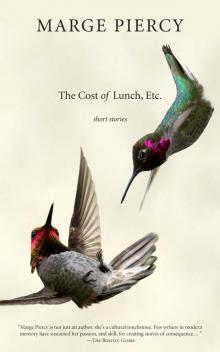 The Cost of Lunch, Etc.: Short Stories
The Cost of Lunch, Etc.: Short Stories Made in Detroit: Poems
Made in Detroit: Poems Sleeping With Cats
Sleeping With Cats Moon Is Always Female
Moon Is Always Female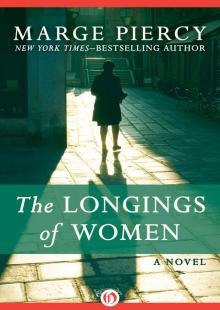 The Longings of Women
The Longings of Women Circles on the Water
Circles on the Water Summer People
Summer People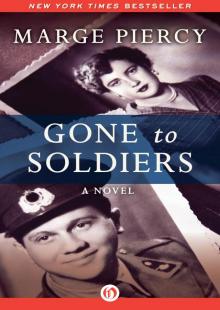 Gone to Soldiers: A Novel
Gone to Soldiers: A Novel The Hunger Moon: New and Selected Poems, 1980-2010
The Hunger Moon: New and Selected Poems, 1980-2010 Vida
Vida Fly Away Home
Fly Away Home He, She and It
He, She and It So You Want to Write
So You Want to Write Small Changes
Small Changes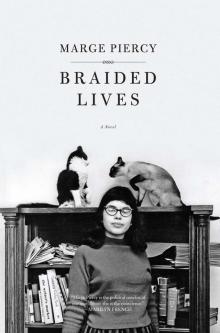 Braided Lives
Braided Lives Lord Valentine's Castle
Lord Valentine's Castle Dance the Eagle to Sleep
Dance the Eagle to Sleep City of Darkness, City of Light
City of Darkness, City of Light The High Cost of Living: A Novel
The High Cost of Living: A Novel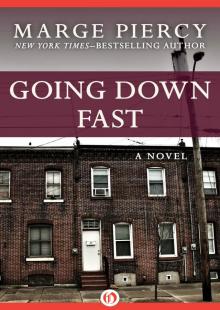 Going Down Fast: A Novel
Going Down Fast: A Novel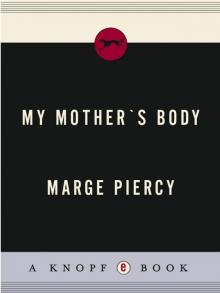 My Mother's Body
My Mother's Body Storm Tide
Storm Tide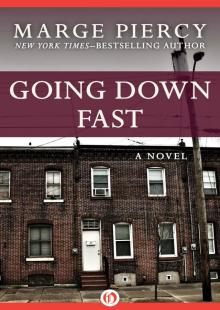 Going Down Fast
Going Down Fast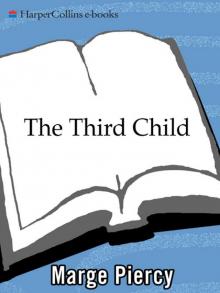 The Third Child
The Third Child The Hunger Moon
The Hunger Moon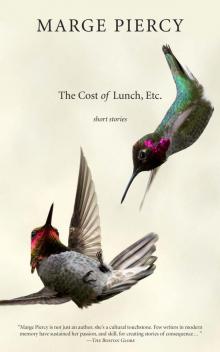 The Cost of Lunch, Etc.
The Cost of Lunch, Etc. Sex Wars
Sex Wars The High Cost of Living
The High Cost of Living Made in Detroit
Made in Detroit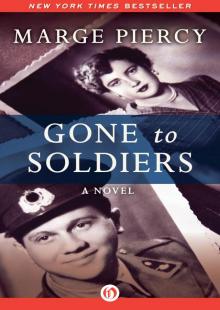 Gone to Soldiers
Gone to Soldiers